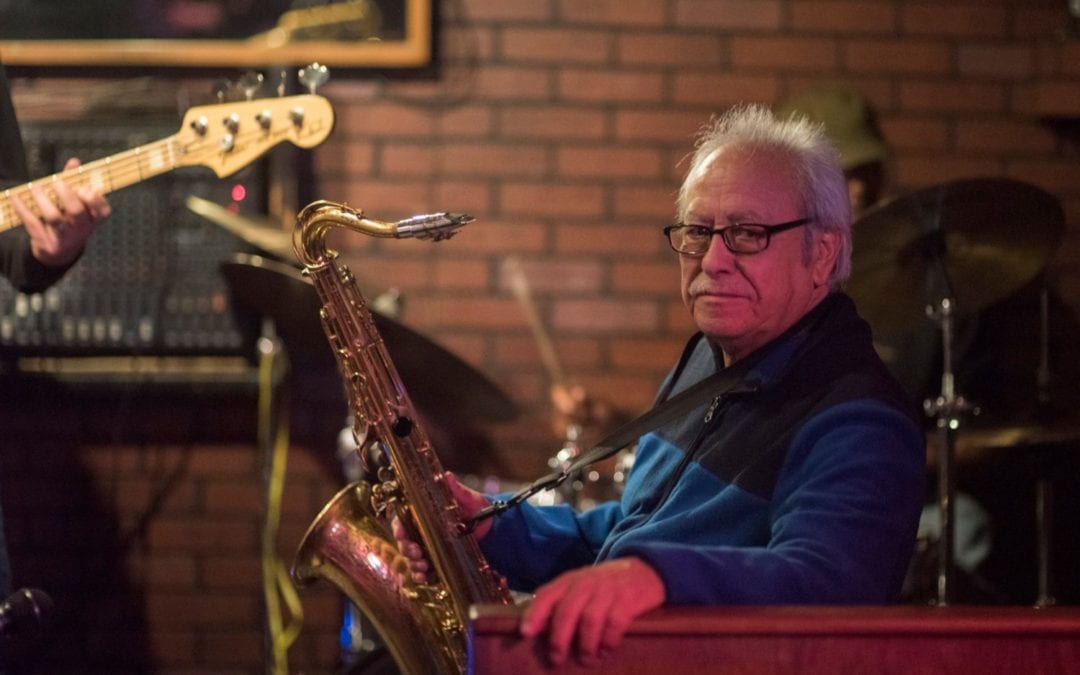Denver jazz legend Freddy Rodriguez, Sr., died Wednesday from complications of COVID-19, the disease caused by the new coronavirus, son Freddy Rodriguez, Jr., said Thursday.
“He was our king, our sax man,” Rodriguez, Jr., said. “Not just in music, but in life. He was an old-school, dedicated person who treated everybody with respect.”
Rodriguez, Sr., 89, had been hospitalized for more than a week at St. Joseph Hospital but played at Lower Downtown’s El Chapultepec club as recently as three weeks ago, said Andrew Hudson, who played bass with Rodriguez for the last two decades as part of his Jazz Connection band.
“I went to the school of Freddy Rodriguez,” said Hudson, who first met and played with Rodriguez at age 15. “One of his greatest lines was when he’d look back at the band with a grin and say, ‘Let’s play this next song, not too fast and not too slow — about half-fast.’ Say it quickly for effect.”
The death of the longtime saxophone player represented one of Denver’s highest-profile losses yet from the global pandemic that has shuttered music venues and most other public spaces in recent weeks.
Rodriguez was a regular performer on the city’s most respected jazz stages, starting during the golden era of the Five Points neighborhood at the Rossonian Hotel, and continuing with LoDo institution El Chapultepec, downtown’s Dazzle Jazz, and the annual Jazz in the Park series at City Park — the last of which held a tribute for the Denver Jazz Hall of Famer in 2014.
In the 1980s and ’90s, internationally touring jazz performers who played in Colorado would regularly flock to El Chapultepec to listen to or sit in with Rodriguez during his Wednesday and Thursday night sets.
“He’s the one who started jazz at the ‘Pec in 1980,” said Carlos Lando, general manager of KUVO, Denver’s jazz radio station. “(Owner) Jerry Krantz hired him, and his influence and his nurturing of so many jazz high school and college jazz musicians was remarkable.”
But El Chapultepec was Rodriguez’ second life and career. In the 1960s, he worked and recorded in Los Angeles, contributing to such well-known platters as Jazz Corps’ self-titled album and collaborating with players such as Tommy Peltier, Wilton Felder and Roland Kirk.
Born Feb. 9, 1931, Rodriguez was raised in the neighborhood now occupied by the Auraria Campus and Elitch Gardens. He got involved in music at Baker Junior High in 1942 after the school began “lending instruments to poor people,” as he put in in a 2011 video celebrating his 80th birthday (and 31st year at El Chapultepec).
Starting on the clarinet, Rodriguez moved to tenor sax by the time he attended Denver West High School. Shortly after graduating in 1948, he joined the Army and performed in a military band in the Seattle area, which allowed him to meet touring and local jazz musicians.
“That was the time of the big band era, and I was very interested in jazz and the big bands,” he said in the video. “I love all types of music … (but) Cole Porter, Jerome Kern, that’s the type of music I grew up on.”
He met his wife, Fina, more 75 years ago and remained married to her until the end, his son said. Rodriguez’ family plans to hold a large, public memorial as soon as it’s safe to do so.
After developing a reputation in Denver in the early 1980s, Rodriguez’ regular nights at El Chapultepec became a focal point of touring jazz musicians who played the Dick Gibson jazz concerts at the Paramount Theatre, or the Jazz Party events held at the Broadmoor Hotel in Colorado Springs.
“If you could name them, they were there,” said Hudson, 54, who started sneaking down to El Chapultepec in high school just to hear Rodriguez play from the open side door. “Slide Hampton, Wynton and Branford Marsalis, Bruno Carr, Nat Yarbrough, Jaco Pastorius, Javon Jackson — so many more.”
Rodriguez’ warm, approachable personality and mastery of diverse genres made him a prominent figure in the scene for nearly four decades, said KUVO’s Lando. KUVO plans to roll out online and over-the-air tributes to Rodriguez over the next few days, and had already begun playing some of Rodriguez’ recordings as soon as the news reached Lando.
“Being a Mexican-American and Chicano, his musical background and interests went not just to jazz but all the music he was around,” said Lando, who broadcast weekly from El Chapultepec from 1992 through 1994 and maintains dozens of hours of archival material. “If the music moved you, he would lock in the groove and just go from there. He did not have any pretensions about whether something is or isn’t jazz.”
Rodriguez would play standards like Duke Ellington’s “Satin Doll” one minute and, in the next, shift to funk like The Commodores’ “Brick House.” Despite having a pacemaker installed about nine months ago, he was loyal to his weekly El Chapultepec gigs until he was forced to stop, Hudson said, usually staying from 9 p.m. to 1 a.m. for every visit.
The nature of Rodriguez’ death has been particularly difficult on his family, Lando added.
“He had been in the hospital for about 10 days and it was really hard on them because they couldn’t be there,” he said.
“He was a wonderful father and grandfather and friend to all,” Hudson said. “And he was swingin’ his butt off until the end.”
This content was originally published here.

